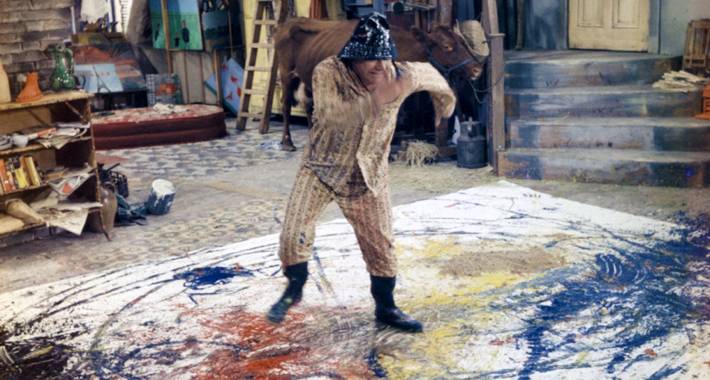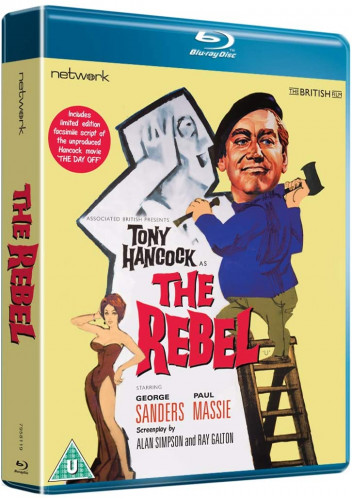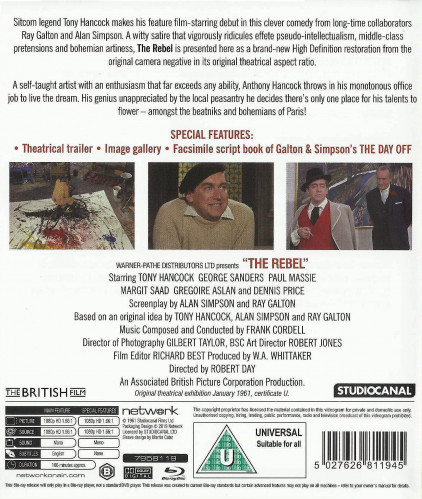TONY HANCOCK: THE REBEL [1961 / 2019] [Blu-ray] [UK Release] From London’s “Bowler-Hatted” Conformity to Paris’ Left Bank Madness!
Sitcom legend Tony Hancock makes his feature film-starring debut in this clever comedy from long-time collaborators Ray Galton and Alan Simpson. A witty satire that vigorously ridicules effete pseudo-intellectualism, middle-class pretensions and bohemian artiness. ‘THE REBEL’ is presented here as a brand-new High Definition restoration from the original camera negative in its original theatrical aspect ratio.
A self-taught artist with an enthusiasm that far exceeds any ability, Anthony Hancock throws in his monotonous office job to live the dream. His genius unappreciated by the local peasantry he decides there's only one place for his talents to flower – amongst the beatniks and bohemians of Paris!
FILM FACT: ‘THE REBEL’ attempts to transfer Tony Hancock's television comedy persona to the big screen, and several regular supporting cast members of Hancock's Half Hour also appeared, including John Le Mesurier, Liz Fraser and Mario Fabrizi. The since-demolished railway station used at the beginning of the film was Bingham Road in the Croydon suburb of Addiscombe, named Fortune Green South in the film. The film’s existentialist themes are explored by mocking Parisian intellectual life and portraying the pretensions of the English middle class. The film also includes scenes parodying modern art. The scene showing Tony Hancock splashing paint onto a canvas and riding a bike over it is a lampoon of the work of Action Painter William Green, while the childlike paintings of Tony Hancock, referred to as the “infantile school” or the “shapeist school,” parody the naïve style. In 2002, the London Institute of 'Pataphysics organised an exhibition consisting of recreations of all the art works seen in the film. There is still dispute whether the drawings and paintings, attributed to Tony Hancock and his roommate, were all produced by the same artist, Alistair Grant (1925 – 1997) or whether Tony Hancock's poor quality “Infantilism School” artworks were actually produced as a joke by the British modernist painter, John Bratby. ‘THE REBEL’ premiere was at the Plaza Cinema in London's West End on the 2nd March, 1961, following a screening at the Beirut Film Festival.
Cast: Tony Hancock, George Sanders, Paul Massie, Margit Saad, Grégoire Aslan, Dennis Price, Irene Handl, John Le Mesurier, Liz Fraser, Mervyn Johns, Peter Bull, Nanette Newman, Marie Burke, Bernard Rebel, Sandor Elès, Oliver Reed, Gary Cockrell, Neville Becker, Marie Devereux, John Wood, Victor Platt, Mario Fabrizi, Barry Shawzin, Peter Avella (uncredited), Hyma Beckley (uncredited), Wallace Bosco (uncredited), Alf Casha (uncredited), Bill Cummings (uncredited), George Curtis (uncredited), Bandana Das Gupta (uncredited), Fred Davis (uncredited), Sally Douglas (uncredited), Hugh Elton (uncredited), Mabel Etherington (uncredited), Marie France (uncredited), Patrick Halpin (uncredited), Victor Harrington (uncredited), George Holdcroft (uncredited), Gerry Judge (uncredited), Juba Kennerley (uncredited), Aileen Lewis (uncredited), Hugh Lloyd (uncredited), Jean Marsh (uncredited), Patrick Newell (uncredited), Edna Petrie (uncredited), Dido Plumb (uncredited), Derek Prentice (uncredited), Bob Raymond (uncredited), Terry Sartain (uncredited), Dani Seper (uncredited), Paddy Smith (uncredited), Esme Smythe (uncredited), Guy Standeven (uncredited), Philip Stewart (uncredited), John Tatham (uncredited), Joseph Tregonino (uncredited), Robert Vossler (uncredited), Brian Weske (uncredited), John Wilder (uncredited) and Ric Young (uncredited)
Director: Robert Day
Producer: W.A. Whittaker
Screenplay: Alan Simpson, Ray Galton and Tony Hancock
Composer: Frank Cordell
Cinematography: Gilbert Taylor, B.S.C.(Director of Photography)
Image Resolution: 1080p (Technicolor)
Aspect Ratio: 1.66:1
Audio: English: 2.0 LPCM Stereo Audio
Subtitles: English
Running Time: 105 minutes
Region: Region B/2
Number of discs: 1
Studio: Associated British Picture Corporation / Network
Andrew’s Blu-ray Review: For the audiences of 1961, accustomed to seeing Tony Hancock as a flickering 405-line black and white image, ‘THE REBEL’ [1961] must have come as a revelation: there was The Lad Himself, larger than life, on the big screen, in colour. Stone me, who'd have thought it! Tony Hancock's ‘THE REBEL’ had me laughing when my side already hurt.
The film ‘THE REBEL’ manages to strike a blow to conformity. Hancock is pompous, windy and an impostor – but he is an individualist. As a bowler-hatted worker, Anthony Hancock [Tony Hancock] hangs his umbrella the wrong way on the office coat stand and is told off by his Office Manager [John Le Mesurier] as well as informing he has no right to do his doodle drawing on company books. Anthony Hancock eschews a cappuccino in the coffee bar as he doesn't "want froth – I want to drink it, not wash me clothes in it" and is served by Waitress Liz Fraser, who scolds him for not wanting froth on his coffee.
Back at his lodgings, in a mid-terraced brick Victorian house, somewhere in outer London, Anthony Hancock dons his artist's smock, and resumes work on his masterpiece, "Aphrodite at the Waterhole"... a truly horrendous but huge sculpture. His landlady Mrs. Cravat [Irene Handl] complains about the hammering noise. Anthony Hancock explains he cannot afford a model and it represents "women as he sees them". Mrs. Cravat threatens to evict him if he does not remove the statue. As Anthony Hancock remonstrates with his copy of Van Gogh's self-portrait on his wall, the floor creaks and the statue falls through, luckily missing his landlady below. I think this is one of the funniest and iconic scenes in the film and totally pivotal to what happens to Anthony Hancock later on in the film.
The film satirises the culture at the time: the aspirational middle-class, the intelligentsia, our view of the European way of life – but with fondness, without superiority. Tony Hancock’s TV writers, Alan Simpson and Ray Galton, scripted this, and they knew their man’s idiosyncrasies intimately. He’s the little man, slightly at war with himself and his fellows, but quick to grasp an opportunity for getting on.
In the film ‘THE REBEL’ he plays Anthony Hancock, frustrated office worker who has a self-proclaimed artistic bent. Feeling stifled by the humdrum, workaday life of being just a clerk, he packs it all in and moves on a whim to France, in order to try and make a living selling his paintings, as well as hoping his creative genius will be seen and appreciated by others. However, he finds infamy in a rather unexpected way, and as with anything Tony Hancock touches – it ends up with him finding himself in an awful pickle. Because an art connoisseur Sir Charles Brewer [George Sanders] boobs and exhibits the paintings of Tony Hancock’s roommate, Paul Ashby [Paul Massie] thinking they are Anthony Hancock’s work. The misfit becomes a national figure.
Among several amusing scenes are those when Anthony Hancock revolts against his office boss, and is invited to an existentialist Left Bank party where the host Jim Smith [Dennis Price] is found sleeping on top of a cupboard, and we see Anthony Hancock “painting” a picture by daubing paint on a canvas and then bicycling over it. Anthony Hancock’s visit to the yacht of a Greek millionaire where he is commissioned to sculpt the tycoon’s vamp wife, a colourful carnival party aboard the yacht which ends up with a hilarious chase. But watch out for a quick cameo appearance of Oliver Reed as an Artist in a Café.
It also tries to give Tony Hancock the broader international appeal he was seeking, by moving him away from the provincial, parochial East Cheam setting audiences in the UK would be familiar with, and taking him ultimately to Monte Carlo. The script also leans toward farce, with there being a case of mistaken identity at the core of the story, leading to misunderstandings, and Anthony Hancock finding himself getting out of his depth as he tries to go along with everyone’s misconception, only to get into deeper bother as things start to spiral out of his control.
I’m not surprised ‘THE REBEL’ has become so acclaimed over the years. It’s a genuine masterpiece which attempted to send up the art establishment, but struck a resounding chord of truth that’s as relevant today as it was almost 60 years ago: art is whatever you can get away with. Like a restored painting, the film has scrubbed up very well and now looks better than ever. In a word, Marvellous!
As the 1950s came to a close, the career of Tony Hancock was nearing its zenith. With half a decade of successful radio and TV series to his credit it was time to make the move into films, a step that would see Tony Hancock aiming high, with ambitions to make it as an international star. The grandiose ambition of “The Lad” might well have come straight from the pen of scriptwriters Alan Simpson and Ray Galton, and is certainly reflected in their script for ‘THE REBEL.’ The Tony Hancock persona as seen on the silver screen would have been very familiar to radio and TV audiences in the United Kingdom: grandiose, but thwarted ambition, followed by the pompous playing-up to his new found fame – and he was afforded plenty of opportunities to deliver the kind of comic routines, facial reactions and vocal nuances that had made him a star.
* * * * *
Blu-ray Image Quality – Associated British Picture Corporation and Network present us the film ‘THE REBEL’ in a stunning 1080p Technicolor image that has been scanned to 2K resolution from the original 35mm A + B camera negative and restored in its original theatrical aspect ratio of 1.66:1. Once again for this Blu-ray release, the restoration carried out involved careful grain management, both automated and manual removal of film dirt and damage, and correction of major instability, warping and density fluctuations. This is a rare chance to see Tony Hancock in glorious Technicolour and against some vivid Parisian backdrops and many shot on location and looks totally sumptuous today as it must have done to the cinema audiences of 1960, even more so in this stunning new restoration. The higher film budget for ‘THE REBEL’ is immediately noticeable in its glorious Technicolour photography, made even crisper by Network’s new High Definition transfer. The significance of this visual prestige Blu-ray disc is not lost in a film that is all about aesthetic appreciation. In a word, Marvellous! Please Note: Playback Region B/2: This will not play on most Blu-ray players sold in North America, Central America, South America, Japan, North Korea, South Korea, Taiwan, Hong Kong and Southeast Asia. Learn more about Blu-ray region specifications.
Blu-ray Audio Quality – Associated British Picture Corporation and Network brings us the film ‘THE REBEL’ once again in just one standard 2.0 LPCM Stereo Audio experience. The audio is nicely rounded and also gives us a good dynamic range and is also very clear, well-modulated sound with no distortion or age-related surface noise, pops, or crackles. The audio experience also manages to capably render the film's soundtrack and razor-sharp dialogue really good and you can hear all of what the actors are saying. In the majority of the film's witty and charming dialogue-heavy scenes, the audio clarity sounds quite crisp and satisfactory to one's ears. Overall the audio quality definitely gets a five star rating from me and well done Associated British Picture Corporation and Network for their sterling work for modern audiences today.
* * * * *
Blu-ray Special Features and Extras:
Theatrical Trailer [1961] [1080p] [1.66:1] [2:46] This is the Original Theatrical Trailer for the film ‘THE REBEL.’ Once again this is a really excellent trailer which really promotes the film superbly and does not at all give away any spoilers.
Special Feature: Image Gallery [1961] [1080p] [1.78:1] [0:00] Here you get to view 48 stunning colour and black-and-white images via a slide show of a UK Poster, USA lobby cards, Publicity Information and rare behind-the-scene photographs on all aspect relating to the film ‘THE REBEL.’ One thing that really confused me, as it states on the US lobby cards that the film is called “Call Me Genius,” to me this is all very surreal and very strange, but of course it was all due the fact that when the film was released in America, because Tony Hancock was not so famous.
PLUS: Beautiful reversible printed double sided Blu-ray cover that features inside a colourful cinema poster, three sepia coloured US lobby card images from the film and Restoration Notes and background information to Alan Simpson and Ray Galton’s facsimile script entitled “The Day Off.”
BONUS: Here we have a miniaturised booklet of the actual Alan Simpson and Ray Galton’s facsimile script book “The Day Off” that informs you that following the critical success of ‘THE REBEL,’ Tony Hancock asked Alan Simpson and Ray Galton to write another comedy for him. This resulted in “The Day Off,” an entertaining piece of character-driven observational comedy about a hapless bus conductor. Tony Hancock rejected it, however, on the grounds that it wasn’t international enough to further his desire to achieve stardom in America and this effectively ended their creative partnership. “The Day Off” is reprinted with this limited edition facsimile script that was scanned from Alan Simpson and Ray Galton’s own hand-typed pages.
Finally, ‘THE REBEL’ has been painstakingly restored from the original camera negative, and it looks even better than ever; so pristine and clear that it could almost have been released for modern audiences. Just don't start looking for errors in the period detail: it really was made in 1960’s era. The Technicolour photography is especially suited to scenes such as those at the party of a modern art collector [Dennis Price]. ‘THE REBEL’ film is tinged with poignancy at the thought of what might have been, and the tragedy that lay just a few years in the future. When Nanette Newman's blue-lipglossed existentialist asks of Tony Hancock: "why kill time when you can kill yourself?" and it's almost an edge-of-the-seat moment as we wait to see his reaction. He considers the remark, before breezily replying: "Yes, it's a point of view. I suppose so." Very Highly Recommended!
Andrew C. Miller – Your Ultimate No.1 Film Aficionado
Le Cinema Paradiso
United Kingdom



